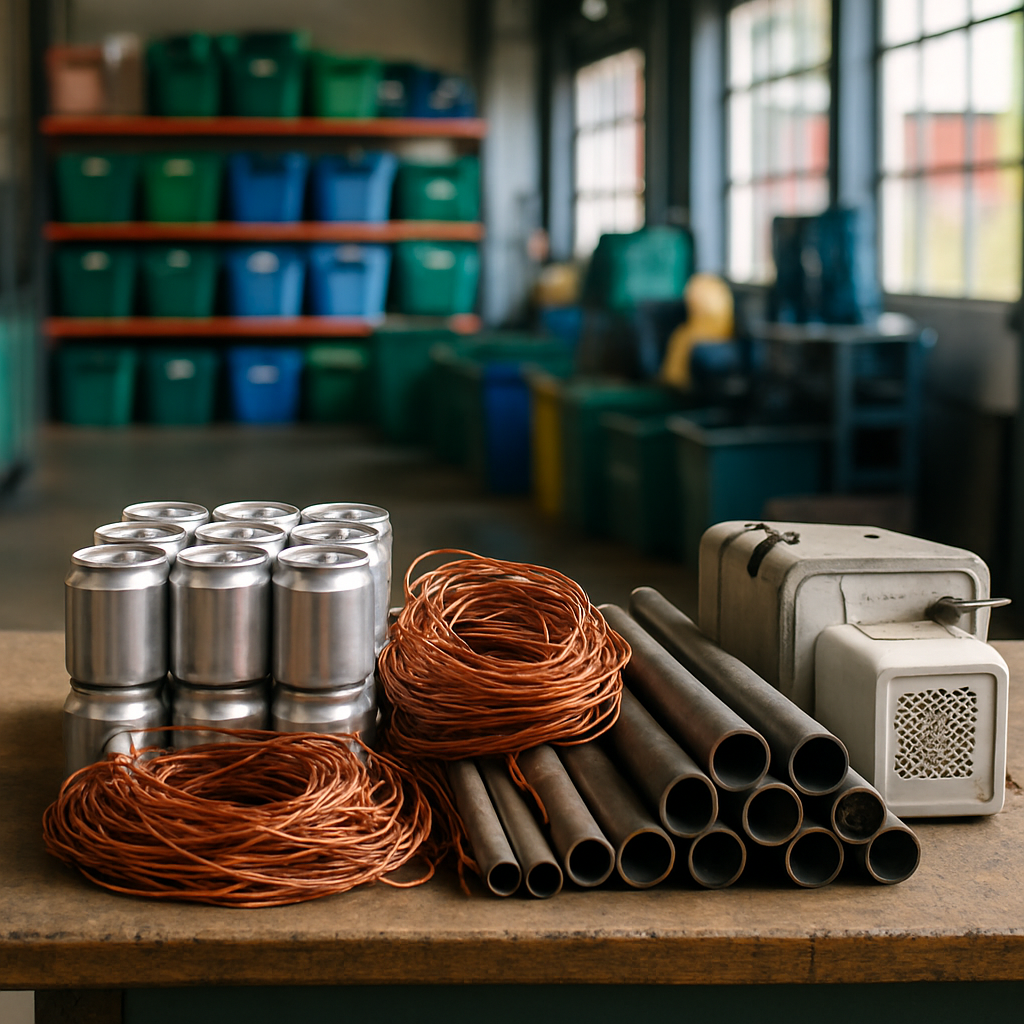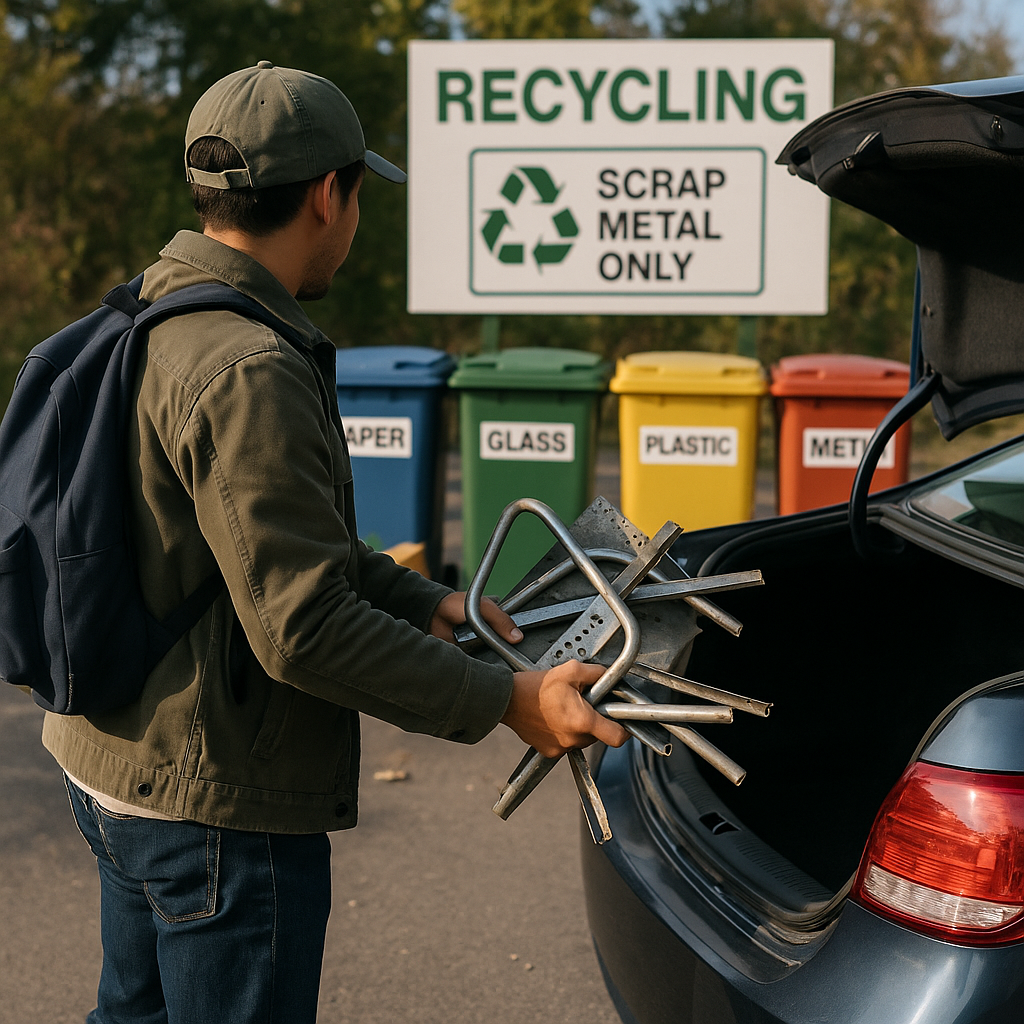5901 Botham Jean Blvd, Dallas, TX 75215
Metal Recycling and Why Donate: Benefits, Types of Metals, and How to Get Started
August 27, 2025Metal recycling transforms discarded metal items into valuable resources for new manufacturing. The process involves collecting, sorting, and processing scrap metal from end-of-life products, converting potential waste into raw materials for new products. From aluminum cans to old appliances and construction debris, almost all metal can find new life through recycling.
Donating scrap metal creates positive effects on our environment and economy. Recycling just a single aluminum can saves enough energy to power a television for three hours. Steel recycling saves 60% of the energy needed for primary production, while aluminum recycling conserves an impressive 95%.
Metal’s unique properties make it infinitely recyclable without degradation. Unlike materials that lose quality through recycling, metals maintain their strength and utility through countless cycles. This circular approach contrasts sharply with the traditional extract-produce-discard model that depletes natural resources. Recent global temperature records highlight the urgency of sustainable practices like metal recycling, which significantly reduces greenhouse gas emissions.
What Types of Metal Can Be Donated for Recycling?

Metal recycling is essential for reducing waste and conserving the environment. Nearly all metals can be recycled without losing their essential properties, making them ideal candidates for the circular economy. Recycling centers usually categorize metals into two main groups: ferrous and non-ferrous.
Ferrous Metals
Ferrous metals contain iron and are typically magnetic. They are fundamental in infrastructure and manufacturing industries. Steel is one of the most frequently recycled ferrous metals worldwide, with approximately 98% of all steel being recycled.
Common ferrous items that can be donated include steel food containers, cast iron cookware, structural steel from construction projects, and various appliance components. Recycling these metals consumes significantly less energy than producing new steel from raw materials.
Non-Ferrous Metals
Non-ferrous metals don’t contain iron and are generally non-magnetic. They are highly valued in recycling programs due to their corrosion resistance and conductivity. Aluminum cans are among the most recognizable non-ferrous recyclables, but there are many others worth collecting.
Copper wiring from electrical components is particularly valuable. This reddish-brown metal has excellent electrical conductivity, making it essential in everything from household wiring to industrial machinery. Brass fixtures, typically yellowish-gold, are common in plumbing and decorative elements. Bronze, another copper-based alloy, often appears in older fixtures and decorative items.
Household Items Containing Recyclable Metals
Your home likely contains numerous items with recyclable metal components. Kitchen appliances such as refrigerators, stoves, and microwaves have various metals worth recycling. Electronic devices like computers, phones, and televisions contain small amounts of valuable metals, including copper, aluminum, and even precious metals.
Vehicles represent one of the largest sources of recyclable metal. From aluminum body panels to copper wiring and steel frames, cars typically contain over a ton of recyclable materials. Even smaller items like bicycles, tools, and hardware contain metals that recycling centers accept.
Plumbing fixtures, gutters, roofing materials, and door hardware are additional sources of recyclable metals commonly found in homes. Even seemingly minor items like clean aluminum foil and metal bottle caps can be recycled rather than sent to landfills.
Specialty Metals
Some recycling centers also accept specialty metals. Lead from old batteries requires special handling due to its toxicity but is highly recyclable. Zinc, used in die-casting for automotive parts and hardware, can be recycled without losing quality. Stainless steel, an alloy containing chromium, is valued for its corrosion resistance and is common in kitchen items and appliances.
The recycling process varies by metal type, but the environmental benefits are substantial across all categories. Recycling aluminum saves up to 95% of the energy required to produce new aluminum from raw materials. Similarly, copper recycling significantly reduces mining impacts while conserving a valuable resource.
How Do I Donate Metal for Recycling?

Donating metal for recycling is simple and benefits both the environment and your wallet. Most recycling centers and scrap yards accept metal donations and often compensate you for them. Understanding the process can make your metal recycling experience smooth and efficient.
Finding a Recycling Center Near You
Locating a facility that accepts metal donations is the first step. Many communities have dedicated metal recycling centers or scrap yards equipped to handle various types of metal waste. An online search for “metal recycling near me” can help you find options in your area.
Major recycling facilities like SA Recycling, which has locations throughout California including San Bernardino and Fontana, accept a wide range of metals. Smaller local operations might also offer competitive rates for your scrap metal.
Types of Metal Accepted for Recycling
Recycling centers typically accept various metals, each with different values. Common recyclable metals include:
- Ferrous metals (containing iron): steel, cast iron
- Non-ferrous metals: aluminum, copper, brass, stainless steel
- End-of-life vehicles and auto parts
- Aluminum wheels and cans
- Radiators and appliances
- Insulated copper wire
The value of your donation depends on the type and quality of metal. Non-ferrous metals like copper and brass usually command higher prices than ferrous metals like steel.
Preparing Your Metal for Donation
Before heading to the recycling center, take time to prepare your metals properly:
- Clean your metal items by removing non-metal components like plastic, rubber, or wood.
- Sort different metals into separate containers if possible. Mixing metals may reduce their value.
- For appliances, remove any hazardous components like refrigerants or mercury switches.
- For electronics containing metal, check if the facility accepts e-waste or if you need to take these items to specialized electronics recyclers.
Taking these preparation steps ensures you get the best value for your metals and helps recycling centers process materials more efficiently.
Transportation Options
For smaller metal items, simply load them into your vehicle and transport them to the recycling center. For larger items or significant quantities, you have several options:
Some recycling centers offer curbside pickup services for large metal items or substantial quantities. Contact your local facility to inquire about this service. Alternatively, if you have a truck or trailer, you can transport larger items yourself. For very large quantities, some scrap yards provide container services where they drop off a collection bin at your location.
What to Expect at the Recycling Center
When you arrive at the recycling facility, the process typically works as follows:
- Staff will ask for identification. Most facilities require a valid ID for metal transactions to prevent theft.
- Your metal will be weighed on a scale to determine its value.
- If your metal requires sorting, staff may help separate different types.
- You’ll receive payment based on current market rates for each type of metal.
Many facilities use drive-through systems where you can remain in your vehicle while staff unload and weigh your materials.
Remember that prices fluctuate based on market conditions, so metal values can change daily. Some recyclers post their current rates online, or you can call ahead to check prices.
By understanding these steps and preparing accordingly, you can make metal recycling a rewarding experience that contributes to environmental sustainability while potentially earning some extra money.
What Are the Benefits of Donating Metal for Recycling?

Metal recycling is one of the most effective environmental practices today. When you donate scrap metal for recycling, you’re not just clearing space in your garage or workshop; you’re participating in a process that significantly benefits our planet, economy, and communities.
The benefits of metal recycling extend beyond merely reducing waste. Let’s explore the substantial impacts your metal donations can create.
Conservation of Natural Resources
Every piece of metal you donate for recycling helps preserve Earth’s finite resources. Mining virgin metal ore involves extensive land disruption, often leading to habitat destruction and ecosystem damage.
By recycling just one ton of steel, we conserve approximately 2,500 pounds of iron ore, 1,400 pounds of coal, and 120 pounds of limestone. These resources remain in the ground where they belong, rather than being extracted through environmentally damaging mining operations.
Recycled metals can be processed repeatedly without degrading their quality. Aluminum, for instance, is infinitely recyclable, meaning we can continually reuse this valuable material without ever needing to mine more bauxite ore.
Dramatic Energy Savings
Metal production from raw materials is incredibly energy-intensive. The extraction, transportation, and processing of virgin ore consume significant amounts of electricity and fuel.
The energy savings from metal recycling are substantial. Using recycled aluminum requires 95% less energy than producing it from bauxite ore. For copper, recycling saves 90% of the energy needed for virgin production. Even steel recycling reduces energy consumption by 60%.
These energy savings translate directly into reduced fossil fuel consumption. The metal recycling industry helps decrease our reliance on non-renewable energy sources while supporting the shift to a more sustainable energy future.
Reduction in Greenhouse Gas Emissions
The energy savings from metal recycling directly contribute to lower greenhouse gas emissions. Mining operations, ore processing, and metal production release significant amounts of carbon dioxide and other greenhouse gases.
According to the Institute of Scrap Recycling Industries, recycling metal reduces greenhouse gas emissions by 300-500 million tons annually. This reduction helps combat climate change and its associated impacts, including extreme weather events, rising sea levels, and biodiversity loss.
By donating metal for recycling, you help minimize the carbon footprint associated with metal production and support global climate change mitigation efforts.
Job Creation and Economic Benefits
The metal recycling industry generates significant employment opportunities across various skill levels. From collection and sorting to processing and manufacturing, recycling creates jobs that cannot be outsourced.
The scrap metal recycling sector supports over 160,000 jobs in the United States alone. These positions provide stable employment and contribute to local economic development, particularly in communities where traditional manufacturing has declined.
Beyond job creation, recycling metals offers direct economic benefits to donors. Many recycling facilities pay for scrap metal based on weight and type. Materials like copper, brass, and aluminum can command substantial prices, providing a financial incentive for recycling.
Reduced Landfill Waste
Metals take hundreds or even thousands of years to break down naturally. When discarded in landfills, they occupy valuable space and can potentially leach harmful substances into soil and groundwater.
By donating metal for recycling, you divert materials from landfills, helping extend their operational lifespan and reducing the need for new waste disposal facilities. This diversion helps protect surrounding communities from the negative impacts associated with landfill expansion.
Metals in landfills represent wasted resources that could otherwise be recycled into new products. Your donations ensure these valuable materials remain in productive use rather than buried underground.
Support for Corporate Sustainability Goals
Many businesses have established sustainability targets aimed at reducing their environmental impact. Metal recycling plays a crucial role in helping companies achieve these goals by providing recycled materials for manufacturing.
When you donate metal for recycling, you contribute to the supply of recycled materials available to manufacturers. This increased supply helps businesses transition away from virgin materials and toward more sustainable production practices.
Companies using recycled metals can reduce their carbon footprint and demonstrate environmental responsibility to customers and stakeholders. Your donations directly support these corporate sustainability initiatives.
Cleaner Environment for Communities
Traditional metal production creates significant pollution through mining operations, smelting, and refining processes. These activities can release heavy metals, acids, and other contaminants into air and water.
Recycling metals drastically reduces this pollution. The process requires fewer chemicals and generates less waste compared to primary production methods. Communities near recycling facilities experience fewer environmental health impacts than those near mining or smelting operations.
Your metal donations help create cleaner air and water for communities worldwide. This improved environmental quality translates into better public health outcomes and enhanced quality of life.
The collective benefits of metal recycling make it one of the most impactful environmental actions available to individuals and businesses. By donating your scrap metal for recycling, you become part of a global solution that conserves resources, reduces emissions, creates jobs, and builds a more sustainable future for everyone.
Conclusion: Making an Impact Through Metal Donation

Donating metal for recycling is one of the easiest yet most impactful ways to protect our environment. From aluminum cans to copper wiring, every piece of metal diverted from landfills makes a significant difference. Recycled materials require significantly less energy to process—aluminum recycling, for instance, saves 95% of the energy needed for virgin production, while steel recycling reduces energy use by 60%.
The environmental benefits go beyond energy savings. Metal recycling significantly reduces greenhouse gas emissions, potentially cutting them by 300-500 million tons each year. Additionally, it decreases the need for destructive mining operations that threaten natural habitats and contaminate soil and water resources.
Want to make a difference? Start by identifying recyclable metals in your home or workplace, and contact Okon Recycling at 214-717-4083 for your recycling needs. Your small action today contributes to a more sustainable future.
